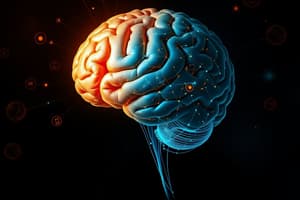Podcast
Questions and Answers
What is the relationship between the self, society, and culture?
What is the relationship between the self, society, and culture?
The self is influenced and shaped by society and culture, which provide the context for decision-making and self-understanding.
Which of the following best defines culture according to Sir Edward B. Tylor?
Which of the following best defines culture according to Sir Edward B. Tylor?
- A set of beliefs and practices unique to a society
- That complex whole which includes knowledge, beliefs, arts, moral, law, customs, and any other capabilities and habits acquired by a human as a member of society (correct)
- The totality of social norms within a civilization
- The arts and moral codes of a group
Anthropology is the scientific study of human life and social groups.
Anthropology is the scientific study of human life and social groups.
False (B)
Match the following components of culture with their descriptions:
Match the following components of culture with their descriptions:
The independent view of the self is also known as ______.
The independent view of the self is also known as ______.
What characterizes collectivism?
What characterizes collectivism?
Flashcards are hidden until you start studying
Study Notes
Understanding the Self as a Social Construct
- Relationship between self, society, and culture is key; they influence decision-making.
- Understanding the self involves comprehending cultural contexts; knowledge of culture is essential.
- Culture defined by Sir Edward B. Tyler as a complex whole of knowledge, beliefs, and customs.
Definitions and Distinctions
- Anthropology: Study of human culture, society, and physical development.
- Sociology: Scientific study of human behavior within social groups and societies.
Components of Culture
- Material Culture: Physical objects created and used by a society, e.g., cars, buildings.
- Non-Material Culture: Abstract elements such as beliefs, values, and norms.
Breakdown of Culture Components
- Survival: Basic needs like food, clothing, defense, and shelter.
- Education: Processes for acquiring knowledge necessary for success.
- Transportation: Methods for moving people and goods.
- Communication: Sharing of ideas and messages within a culture.
- Economy: Acquisition of necessities and desires.
- Technology: Tools and innovations that simplify life.
- Social Structure: Hierarchies and importance of roles within a culture.
- Beliefs and Traditions: Core ideas and celebration methods within the culture.
- Rules and Regulations: Systems maintaining order in society.
- Arts & Recreation: Cultural expressions and leisure activities.
Individualism vs. Collectivism
- Individualism: Independent view of the self; decisions made autonomously; typical in industrialized societies.
- Collectivism: Interdependent view where individuals see themselves as part of a community; decisions influenced by social connections.
- Individualism linked to traits such as personal efficacy and low social integration typical of modern societies.
Studying That Suits You
Use AI to generate personalized quizzes and flashcards to suit your learning preferences.




